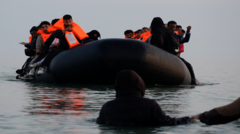Andrew Harding
Reporting fromFrench coast, south of Calais
A number of French gendarmes watched the boat being boarded but declined to intervene
As the weather in the Channel clears, the French police are struggling to halt a potentially record-breaking surge of people from reaching the UK in small boats organised by a growing network of smuggling gangs. Downing Street said on Tuesday the situation was “deteriorating.”
Although the French authorities claim they’re now intercepting more than two thirds of those boats before they reach the sea, the smugglers are now changing tactics to launch so-called “taxi boats” from new sites, in new ways, and with ever greater speed.
Instead of inflating their boats in the dunes along the coast, close to police patrols, the gangs are launching them from better hidden locations, often dozens of kilometres from the main departure beaches.
They then cruise along the coastline, like taxis or buses, picking up their paying customers who now wait in the sea, out of reach of the police.
Marianne Baisnée/BBC
French police say the boats are too vulnerable to be stopped at sea without the risk of drownings
Just before sunrise last Friday, we encountered a group of perhaps 80 people gathered in calm, waist-deep water, off a beach near the village of Wissant, south of Calais. There were several women and children in the group, from countries including Eritrea and Afghanistan.
We counted 18 French gendarmes watching them from the shore, declining to intervene.
An inflatable taxi boat, operated by a smuggling gang, had just arrived by sea and now circled repeatedly. Over the course of perhaps 10 minutes, one man sitting at the front of the boat appeared to usher people forwards, to clamber onboard in relatively organised, even orderly, groups.
Several children clung, occasionally crying, to their relatives’ shoulders.
“Yes, to England,” one Afghan man told me, patiently waiting his turn, his eyes focused firmly on the boat.
The taxi boat system appears to give the smugglers a little more control over what has often been a chaotic and dangerous process, involving large crowds dragging boats to the water and then scrambling on board.
A little over a year ago, I watched the result on a nearby beach when about 100 migrants tried to pile onto the same boat. Five people, including a seven-year-old girl, were trampled or suffocated to death.
Lea Guedj/BBC
After launching from hidden sites, the taxi boats cruise France’s coastline picking up customers
On Friday morning, Colonel Olivier Alary stood, dry-footed, watching the taxi boat load up. He explained that the current operational rules for his forces were clear. They would intervene to rescue someone if they were about to drown. They might even attempt to stop the boat if it became trapped on a sandbank. But it was simply too risky, for all involved, for the police to try to reach the boat now that it was afloat.
“The police will be able to do more… if the rules governing our actions at sea are changed,” said Alary, referring to the French government’s declared intention to revise those rules.
The government has since confirmed there are plans to unveil new guidelines next month which would enable its police to intervene more forcefully with small boats in shallow waters.
The BBC understands a new “maritime doctrine” would allow special squads to intercept migrant dinghies up to 300 metres from the shoreline.
“It’s essential that we don’t create panic and endanger these people further. If the rules change to allow us to intervene against these taxi boats, as close as possible to the shore, then we’ll be able… to be more effective,” said Alary, as the fully loaded boat finally set off north-westwards, towards the English coast.
Although some officers say there is already a bit of wiggle-room for the police in terms of how strictly they interpret the existing rules, many are fearful that they might face serious legal trouble.
“I can understand an average British person watching this on television might say, ‘Damn, those police don’t want to intervene.’ But it’s not like that. Imagine people on a boat panic and we end up with children drowning. The police officer who intervened would end up in a French court. It’s a compli
Read More





